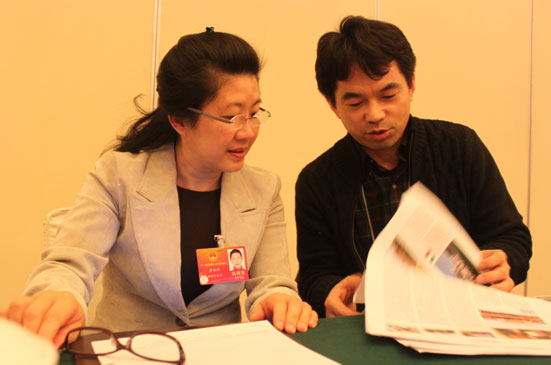
Zeng Jingping is one of the most celebrated Liyuan opera performers, but she is faced with the challenge of sustaining the very existence of her art form.
"It's extremely hard for us to pass on this art form because we have a serious lack in funding," Zeng, who heads the Liyuan Opera Experimental Troupe in Fujian province, told China Daily on Sunday while attending the current session of the National People's Congress as a deputy from Fujian province.
 |
|
Liyuan opera star Zeng Jingping, NPC deputy from Fujian (L) answers a question from a reporter in Beijing, March 4, 2012. [Yan Weijue/chinadaily.com.cn] |
Liyuan Opera, which literally means Pear Orchard Opera, originated in the Song Dynasty in Eastern China's Quanzhou. It boasts a history of more than 800 years and is included in the state-level Intangible Cultural Heritage list.
In 1953, local folk artists established the Minnan Opera Troupe, the predecessor of the Liyuan Opera Experimental Troupe. Since then, the troupe has been trying to survive amidst a gauntlet of challenges and disappointments.
"Currently the Quanzhou government gives us an allocation of 5 million yuan ($794,000) which covers 75 percent of our expenditures," Zeng said. "but we cannot meet the remaining 25 percent by ourselves."
The 200-person troupe holds more than 200 performances at home and abroad every year. It is also well received in?Hong Kong and Taiwan. The troupe has taken part in international cultural exchanges at the invitation of countries in Southeast Asia and Europe.
Zeng?Jingping is the brightest star in the troupe,?having won the Plum Performance Award, the nation's highest prize for Chinese drama performer?twice.
However, box office receipts are not enough to cover employees' social security, much less the resources necessary to pass on the art form.
"We spend lots of energy on collecting information on Liyuan opera, such as music and scripts," Zeng said. "Teaching Liyuan opera is much more complicated than just passing it on person-to-person. It involves all the components of the opera."
Sadly, the opera's talent pool is shrinking. Fifty-nine years after it began, all of the troupe's founders, with the oldest at 73 years of age, still perform on stage today, trying to retain the art's original flavor.
"As more people become better off, few choose to take up this business. Our troupe is the only one of its kind in China. Liyuan opera is taught in only one class at an art college in Fuzhou," Zeng said. "Of course the teacher is a member of our troupe."
After Zeng was appointed the troupe's head in 1999, she realized she had to do something more to preserve this art.
"Every year in the past decade during my two terms as a NPC member, I have submitted proposals for better preservation of ancient dramas and customs. I'm happy to see that some of them were considered by authorities," Zeng said.
The Sixth Plenary Session of the 17th CPC Central Committee that convened last October put unprecedented emphasis on the country's culture. Many government-run commercial cultural organizations will undergo systemic transformations, as the government wants to establish a modern-day culture industry.
"The reform is a must, but we should carry it out prudently," Zeng said. "Liyuan opera is an ancient opera that has a history of more than 800 years. The troupe should be considered a public institution that sustains a classical dramatic art form. If we follow the trend of commercialization, it may cause great harm, as this opera form may lose its core value."
"We believe people will one day realize the rarity of this art form and preserve it. They will realize that culture is as important as the economy, " she added.